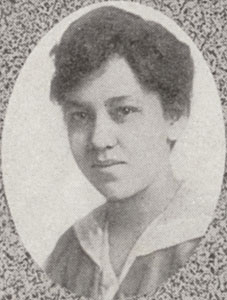Black History Month: For Mabel Watson Raimey, perseverance was the only option
This Black History Month, we remember Mabel Watson Raimey, who is believed to be the first African American woman to graduate from UW–Madison.
At age 14, with a high school diploma already in hand from Milwaukee’s West Division High School, Mabel Watson Raimey told her family physician that she wanted to be a doctor.
“Women aren’t smart enough,” he told her.
So when Raimey came to UW–Madison, she decided to study English and become a teacher, one of the few professions regarded as acceptable for women. In 1918, she graduated and promptly took a job teaching in her hometown.
She was fired after just three days. School officials had learned that Raimey, who they had assumed was white, was African-American. In fact, she’s believed to be the first African-American woman to graduate from UW–Madison. And that is just the beginning of her story.
• • •
After her short-lived teaching career, Raimey worked as a secretary in a downtown Milwaukee law office. She later enrolled at Marquette University Law School, working days and going to school at night. She was one of only three women in her class and the only black woman – another first.
“Nobody asked” about her race, Raimey said. “I never told.”
In 1927, she became the first black woman to practice law in Wisconsin. The American Bar Association refused to admit black lawyers — a barrier that remained until 1943.

When Raimey came to UW–Madison, she decided to study English and become a teacher. 1919 Badger Yearbook / UW Archives
The battle for women to practice law in Wisconsin began in 1876 when Lavinia Goodell‘s petition for admission to the bar was denied by the Wisconsin Supreme Court.
“The law of nature destines and qualifies the female sex for the bearing and nurture of the children of our race and for the custody of the homes of the world and their maintenance in love and honor,” said Chief Justice Edward G. Ryan. “There are many employments in life not unfit for female character. The profession of the law is surely not one of these. The peculiar qualities of womanhood, its gentle graces, its quick sensibility, its tender susceptibility, its purity, its delicacy, its emotional impulses, its subordination of hard reason to sympathetic feeling, are surely not qualifications for forensic strife.”
Goodell didn’t give up. In 1877, she successfully lobbied for a law prohibiting discrimination in the practice of law because of sex. She reapplied to the Wisconsin Supreme Court in 1879 and this time she was admitted. She died less than a year later.
While Goodell won her fight, it took much longer for women of color to advance. There was good reason for Raimey not to talk about being black.
Raimey knew that by passing as white, she might gain opportunities that others were denied, writes Phoebe Weaver Williams in “A Black Woman’s Voice: The Story of Mabel Raimey, ‘Shero’” from a 1991 issue of the Marquette Law Review. “Her decision to attend Marquette Law School under these circumstances must have been troubling. She risked discovery by the White community, and sanction from the Black community. She knew the White community could exact severe punishment if her race were discovered. She must have surmised the Black community could view her behavior as an act of betrayal rather than desperation.”
“Her decision to attend Marquette Law School under these circumstances must have been troubling. She risked discovery by the White community, and sanction from the Black community.”
Phoebe Weaver Williams
There weren’t many opportunities for female lawyers. “Many of them opted to practice with their fathers or husbands, a route not open to Mabel,” according to the book “Pioneers in the Law: The First 150 Women.”
Raimey continued working as a legal secretary even after she earned her degree. No line was forming for the state’s first black woman lawyer. It took time, but eventually she was able to practice law and represented clients of all races in probate and business matters. Reports from her friends and acquaintances suggest that she charged “reasonable” fees, to the detriment of her own finances. How much of this was due to generosity and how much was due to necessity to acquire clients? It’s impossible to say.
• • •
Raimey’s Watson ancestors were among the first African-American families to settle in Milwaukee in the 1850s. Molly Watson, Mabel’s great-great grandmother, was born in West Africa.
“Molly and her brother were lured from their African homeland with promises that they would receive an education. Instead, they were sold into slavery,” Weaver Williams writes.
Molly gave birth to Sully Watson, Mabel’s great-grandfather, in Virginia. Molly’s slave owner is listed as the father.
In 1827, Sully Watson started working to buy his freedom by doing construction and blacksmith jobs. Six years later, he was finally free. Sully and his wife, Susanna, had to leave Virginia — the law required newly free slaves to leave the state within a year of emancipation.
It took time, but eventually she was able to practice law and represented clients of all races in probate and business matters.
They settled in Ohio until 1850, when they moved to Milwaukee. Their great-granddaughter was born Dec. 22, 1900.
“We are reasonably sure that the Raimey family knew the benefits of an education, and willingly sacrificed so that Mabel Raimey would excel in her educational endeavors,” Weaver Williams writes. “Her family records include a bill for kindergarten tuition, a program stating she was a member of a ‘baby band,’ and a letter to her parents from her teacher. Their existence and manner of preservation of these records reveals how proud her parents must have been of their efforts to educate Miss Raimey.”
• • •
Raimey never married, although she had three offers, she told the Sentinel. At the time, professional women didn’t combine careers with family, she said.
“Should women attempt both today?” the reporter asked her in 1984.
“Stay home,” she answered sternly, shaking her head and waving her finely manicured hand.
Friends described her as a workaholic. She was active in organizations whose missions involved improving conditions for African-Americans in the Milwaukee community. Raimey chartered the Epsilon Kappa Omega Chapter of the Alpha Kappa Alpha sorority in Milwaukee in 1949. She also helped start the Northside YWCA (now known as the Vel Phillips Center), and became a board member for the Milwaukee Urban League, where she served for 25 years.

It took time, but eventually Raimey was able to practice law and represented clients of all races in probate and business matters. UW Archives
She was active in her church and known for her willingness to tackle any task. That meant serving as president of the church’s board of trustees and its attorney when the church relocated, and occasionally donning overalls to check on the furnace.
In 1972, she suffered a stroke while taking a bath in her apartment. Unable to move, she drank bath water for five days until friends discovered her. The illness ended her legal career.
It wasn’t until later in life that she received much recognition for her many accomplishments. In 1984, the Milwaukee chapter of the Association of Black Women Attorneys was named in her honor. That same year, she was recognized in Congress as part of Women’s History Week.
“Miss Raimey is a woman who has first-hand experience with achievement,” said U.S. Rep. Jim Moody, who represented Milwaukee from 1983 to 1993. “Her personal struggle to be recognized as an equal in a white, male-dominated world reminds us how far we have come and unfortunately, how far we must still go.”
His praise was heard by a mostly male crowd – in 1984, only 24 of the 535 members of Congress were women.
“If any accomplishment that I may have made has had any influence on any young people, I am pleased more.”
Mabel Watson Raimey
Raimey herself was matter-of-fact about her struggle and her achievements.
“Professionally, it was always my intention to serve all people, regardless of race, color, creed, or economic ability, in a fair and just manner. If my acceptance and completion of law school at Marquette University in the 1920s has inspired or encouraged anyone to enter the field of law, I am pleased,” Raimey said while accepting an award from the Black Law Students Association at Marquette. “If any accomplishment that I may have made has had any influence on any young people, I am pleased more.”



